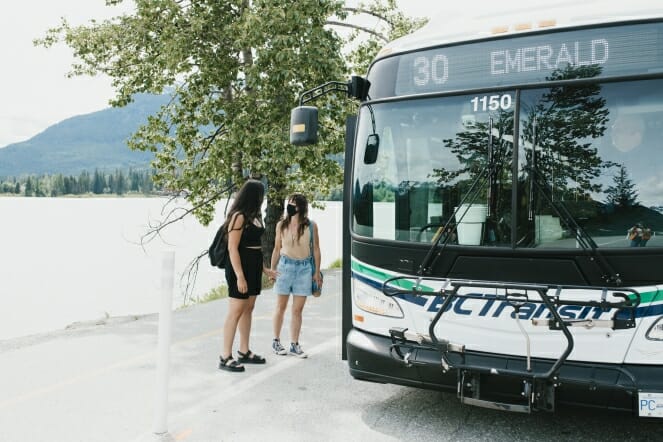Actions support optimizing and expanding Whistler Transit Service
The Resort Municipality of Whistler (RMOW) is proposing a 35 per cent increase in transit service hours over the next five years to support the optimization and expansion of the Whistler Transit System.
On Tuesday, Council received the revised Transit Future Action Plan (TFAP), which identifies and prioritizes the services, infrastructure and investments needed to achieve a 20 per cent transit mode share target by 2025. The TFAP builds on BC Transit’s 25-year strategic plan, Sea to Sky Transit Future Plan (TFP, 2015).
“Increasing transit service hours allows us to focus on initiatives that improve the frequency and convenience of our transit service, both of which are strong drivers when it comes to getting people to take the bus,” said Mayor Jack Crompton. “By investing in improvements to transit services and infrastructure, we’re taking important steps in moving beyond the car and meeting our climate action targets”.
Key service initiatives highlighted in the plan to support the transit mode share target include:
- A return to pre-pandemic seasonality. Bringing back the Late Winter service in April 2023 and beginning service earlier in December 2023 to align with pre-pandemic schedules;
- Changes to the 10-Valley Express service. Introducing a pilot project that will route service into Whistler Village, with a short turn in Function Junction, as well as increasing service frequency to 15 minutes during key commuter times in the spring/summer/fall.
- Whistler South service improvements. Improvements to routes 10, 20, 20x and 21 to increase trip frequency in spring/summer/fall, and additional trips added to route 25 to provide more consistent service throughout the day. These routes produce the most ridership.
To ensure service level improvements can be reached, both infrastructure and capital improvements will be required. Key initiatives underway include:
- A Rapid Transit Network study. The goal of this study is to find the best route for the 10-Valley Express, with opportunities for new transit priority measures, such as a rapid transit line, and bus stops.
- Upgrading highway bus stops. Reviewing and designing upgrades to existing and new highway bus stops to improve passenger comfort and accessible access to transit.
Future initiatives will be funded through a combination of funds from property taxes, allocation of Community Transportation Initiative funds, Resort Municipality Initiative (RMI) funds and the Three-Year Whistler Transit System Expansion Plan 2023/24 – 2025/26 Memorandum of
Understanding (MOU) between BC Transit and the RMOW, which will allow BC Transit to request matching funding from the province for the 5,000 service hour expansion proposed for 2023/24.
In 2020, the percentage of trips taken by transit was seven per cent, due to the pandemic, down from 14.5 per cent in 2019. Since the return of transit service in June, summer transit ridership has approached 2019 levels. More details will be available in the fall with the full Transportation Action Plan 2022 Monitoring Report.
Expanding the Whistler Transit System and investing in improvements to infrastructure serving the transit system are guided by Climate Action Big Move 1: Moving Beyond the Car, with the goal that by 2030 50% of all trips in Whistler are by transit or active transportation.
For more information, visit whistler.ca/transitplanning.

